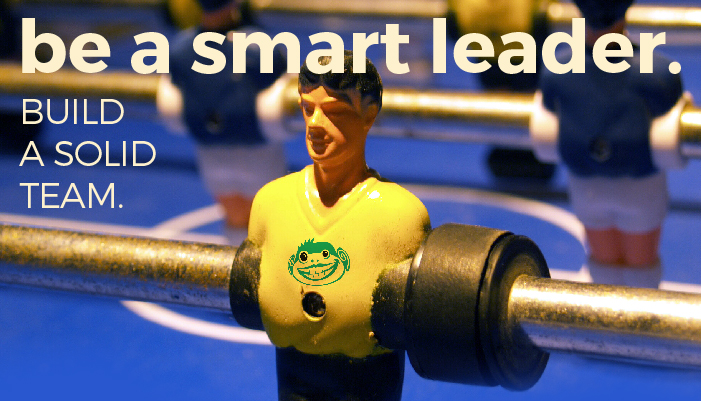
Entrepreneurs often suffer from an “I can do it all myself” mindset. It comes with the territory. They act as their own CEOs, accountants, administrative assistants, marketing leaders, sales reps, technical support specialists, travel agents, etc. You name it; most entrepreneurs are proverbial “jacks-of-all-trades.”
Is this how you run your business, or even your household?
While it’s great to be talented and have a hand in all aspects of your business or home life, just how practical and sustainable is such an approach? What about the people around you at work or at home? What can they contribute?
- Are you really the BEST person to do the company finances?
- Are you really the BEST person to make sure your computer network is connected, secure, and optimized?
- Are you really the BEST person to tackle that leaky pipe under the kitchen sink, do the groceries, pay the bills, and balance the checkbook?
The answer is, “probably not.” Chances are, while you may be able to do some or all of those things, you’re not the most qualified person to perform the task.
Smart leaders know they can’t do it all, so they surround themselves with teams and team members who are especially good at what they do (for more on the importance of assembling a team of top talent, read my blog “Does Your Team Make the Grade?”). That gives smart leaders the time they need to do what it is they do best—whether that’s being the company visionary, marketing guru, relationship builder, or something else—while serving as role models that inspire and guide their teams to do their very best.
Are you a smart leader? Do you rely on others to do those things that aren’t necessarily in your wheelhouse?
Let’s face it, we’d all like to be good at everything, and entrepreneurs are especially guilty of feeling that way. It’s a big part of what makes them successful. But it’s OK not to be the top dog (or King Monkey) at everything. Really, it is.
Early on as you built your company, you may have needed to be the master of everything, and perhaps doing it “all” at that point was feasible. But for most successful entrepreneurs who want to take their businesses to the next level, putting together a team of top talent is a necessity. (If you want to learn more about how the Barrel O’Monkeyz team evolved, read my blog “Be True to Your Brand Story.”)
When you’re surrounded by a top-notch team, you don’t have to be the “one and only,” the one with all the ideas, the one generating all the momentum. Granted, as leader you provide the focal point, the motivation, and the “push” your team needs to achieve whatever results are desired (you’re the conductor and your team is the orchestra), but it’s the team as a whole that makes things happen. (For more on this idea, read my blog “The Three ‘P’s of Teamwork: People, Processes, and Place.”)
Minions Teamwork!
There’s an old saying credited to Aristotle: “The whole is greater than the sum of its parts.” Nothing can be truer when applied to the concept of teamwork, especially when that team is led by a smart leader—one who gives the team the space and independence it needs to thrive:
- Clear Mission/Purpose—there should be no question what your team is about and what it’s been assembled to do. A common cause/purpose builds cohesion and collaboration.
- Well-Defined Roles and Responsibilities—Each team member needs a clearly defined role and responsibility. If something needs doing, there should be no gray area as to who’s responsible to make it happen.
- Team Members Must Have Skin in the Game—Members of your team can’t just be there when there’s work to do, relying on their leader/CEO to spoon-feed them work. Teams have to be part of the “hunt” to find new clients, new projects, and new, innovative solutions. There has to be something in it besides a paycheck for them to show up for work motivated and energized to contribute their very best. Having skin in the game rewards their hard work and ties their success into the company’s success.
- Shared Values/Culture—Successful teams must share values such as dependability, hard work, integrity, and the ability and desire to collaborate. Shared values are the essence of what teamwork is all about. Without cultural alignment, conflicts arise and personalities clash, leading to team dysfunction.
- Requisite Skills, Talent, and Ability to Learn—Teams must have a base level of talent and skills necessary to get the job done. They must also be willing and able to learn new skills as team objectives/environments change.
- Ability to Adapt/Change—Business success does not always follow a linear path. Teams that are nimble, flexible, and able to adapt to changes in the marketplace and to competing priorities are often those most equipped for success.
- Ability to Lead in their Own Areas of Expertise—While you may be the leader of the company, team members sometimes need to stand up and take charge within their own areas of expertise. Similarly, team members must be willing to accept others in leadership roles and take guidance from them.
A great example of how teams with a clear purpose, well-defined roles, shared values, and skin in the game can achieve success is my recent experience with DMOS Collective. I’ve been hard at work with DMOS for the past year, helping this team of active lifestyle entrepreneurs get their Kickstarter campaign for their new Kicker Tool™ off the ground. Now, with more than 200 backers (and counting), DMOS finds itself ready to produce its first batch of kicker tool shovels . . . and that’s with 20+ days still to go in the campaign (talk about teamwork!).
As a leader, your team most likely looks to you for guidance, mentoring, and coaching. You’re the glue that binds and the catalyst that energizes. But you can’t do it alone—even though your entrepreneurial “leader” brain tells you otherwise. You must surround yourself with people you can count on, and they need to know they can count on you. With the right people in place, you can then build systems and process around your team to take your business to the next level.
What team-building experiences do you have to share? What’s worked or hasn’t worked?
Share your comments here.
Paul June is King Monkey of BARREL O’MONKEYZ, a full-service digital media and marketing group specializing in more creativity, ideas, and fun for active lifestyle consumer products, sports marketing, and brands in San Diego and Southern California.
